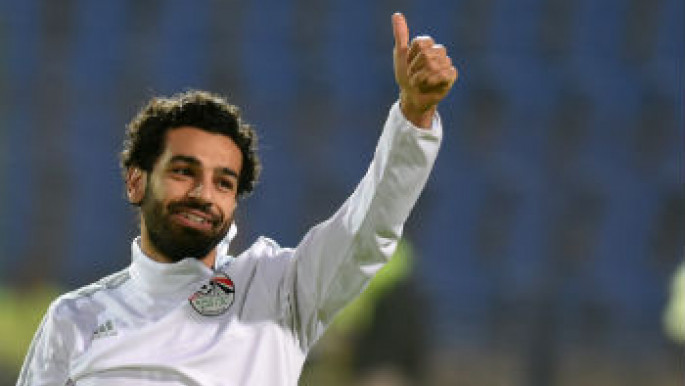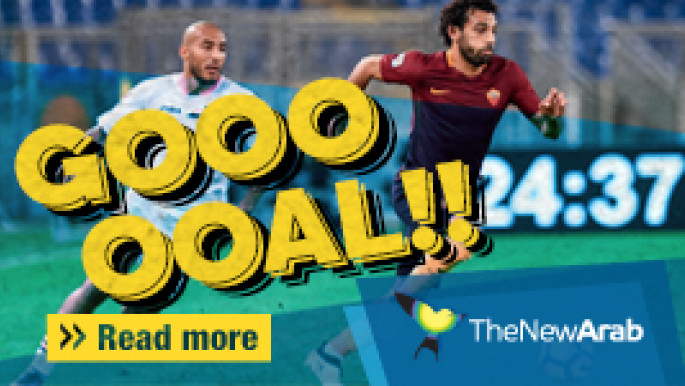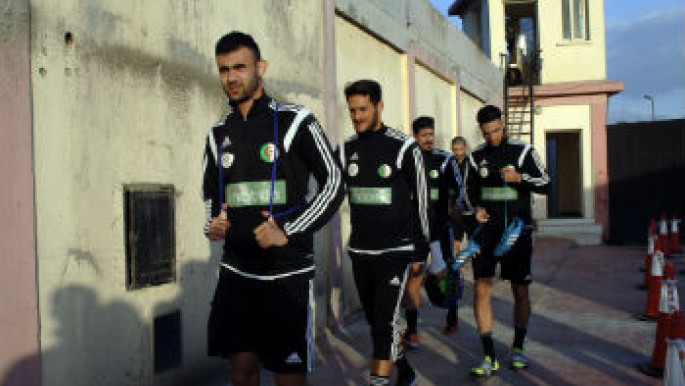Arab superstars take on Africa's Cup of Nations
It's one of the most eagerly awaited football tournaments on the planet - and the Africa Cup of Nations will finally kick-off this Saturday January 14. The football world's eyes will be fixed on Gabon, where talent from all over the continent will show off their skills and passion for the tournament's 31st instalment.
Egypt, Algeria, Tunisia and Morocco will all take part in the group stage, representing the Middle East and the Arab world. Each arrives with its own aspirations, objectives, national pride and history.
While a few of the Sub-Saharan national teams have faced difficulties in calling-up their Europe-based players for the tournament, in the Arab world - particularly in North Africa - the situation seems to be different. Here in the Maghreb, when the national team is calling, refusal is not an option. No matter the timing, no matter the circumstances.
In Morocco, Tunisia, Algeria and Egypt, the love and the support of the fans for their national teams is massive and impressive, but at the same time demanding and stressful.
Riyad Mahrez can't say 'non' to Algeria, despite the pressures on him at Leicester. Mohammed Salah wouldn't say 'la' to Egypt.
"When the Muntakhab is playing, everybody is coming."
So here's a guide to every Arab national team taking part in the competition. Yallah.
Egypt
Egypt is again a top contender for winning the Africa Cup of Nations this year.
The Egyptians have an experienced squad, with talent and depth, which, under the guidance of Argentinean coach Hector Cúper, has produced a perfect blend of veterans and youngsters.
Local figures like Essam Al-Hadary of Wadi Degla and Abdallah Al-Said of Al-Ahly are taking to the field alongside European stars including Arsenal midfielder Elneny, Mahmoud Kahraba of Ittihad Jeddah and Mohamed Salah, AS Roma's celebrated winger.
 |
|
| Egypt's Mohamed Salah has found fame and fortune on Europe's pitches [AFP] |
They seem once again to have produced one of the strongest Arab sides in this year's cup.
But Cúper has made one shocking move, with the elimination of Basem Morsy, Zamalek's leading forward, from the squad.
"I missed my father's funeral to be part of Egypt's match against Tanzania," he told reporters. "Of course I'm sad [not to be included]".
Egypt plays in Group D, against Ghana, Uganda and Mali.
Egypt has held a fierce but healthy rivalry with the Ghanaians, after the Black Stars gave the Egyptians a 6-1 hammering in Kumasi during the 2014 World Cup qualifiers.
In November 2016, Ghana came to Borg Al-Arab Stadium in Alexandria, but couldn't threaten the Pharaohs on their home turf, losing 2-0 in front of 88,000 Egyptian fans in the 2018 World Cup qualifiers.
Egypt have won the tournament seven times, but qualified for Gabon after seven years without taking part in the competition, due to the political, social and economic fallout of the 2011 revolution.
Football is much more than just a game in Egypt. The 2012 Port Said disaster, which ended with the death of 74 Al-Ahly fans, played a serious part in the coup d’état led by Abdel Fattah al-Sisi.
The antagonism felt by many Egyptian fans towards Sisi led many to believe that any success of the national team would only be some kind of scam to hide another corruption scandal, or an attempt to harm the Gumhour, the public.
Nevertheless, the team will received huge support - and if they were to win the tournament, there will be an unforgettable party from the Aswan to Cairo, from Alexandria to Siwa.
Algeria
Like Egypt, the Saharan Warriors are among the strong favorites for glory in this tournament.
 |
|
| Catch up with all our football coverage from across the Middle East |
Also like in Egypt, football in Algeria is much more than just 90 minutes of kicking a ball about.
Football was used by the Algerian FLN (Frontier Liberation National), in the end of the 1950s to gain international llegitimacy for the Algerian nationality and aspirations for liberation from French colonialism.
The FLN's national team travelled the world for matches and brought Algerian nation-hood to worldwide attention. The squad was, however, mostly based around Algerian players who were born or lived in France. Eventually, the FLN team became the national team of Algeria after independence in 1962.
Nowadays, Algeria presents a quality squad that may signify the golden age of the Algerian national team. Today, as before, most of the squad are French-born players.
Riyad Mahrez, Islam Slimani, Yacine Brahimi, Fouzi Ghoulam and Nabil Bentaleb are all part of the glittering Algerian roster. Only six national squad players were born in the country - and there is only one who plays in the Algerian League.
But this is not the crucial issue faced by the team, with problems surrounding the choice of coach. Georege Leekens, the Belgian, was not a popular hire among fans who had hoped for the Bosnian Vahid Halilhodžić.
Leekens is considered a defensive coach, and the supporters fear he will fail to correctly use the attacking arsenal of the squad. Algerians can't forget Leekens last tenure of the national team in 2003. He resigned, citing personal reasons, but took a job at Excelsior Mouscron just a few months later. In addition, his failed stint in Tunisia isn't adding to his reputation.
In Group B, Algeria will meet their neighbours from Tunisia, the powerhouse Senegal and the Zimbabwean minnows. Due to successful World Cup campaigns in 2010 and 2014, most fans agree that nothing but a semi-final will do for Mahrez and co.
But many in Algeria are trying to be realistic, with the current momentum of the team and the fact that Algeria have won the Cup of Nations only once before - in 1990, when they were hosting the event. Triumph in Gabon is not going to be an easy task.
 |
|
| Algeria's Saharan Warriors have high hopes but realistic expectations [AFP] |
The 2018 World Cup qualifications began horribly for Algeria, who tied with Cameroon and lost to Nigeria.
Thus, a total fiasco is actually one option the Khadra's fans can't dismiss.
"I predict Algeria will either crash out in the first round as they have a very tough group, or will go to the semi-final or final," concluded Maher Mezahi, one of the leading football journalists in Algeria.
Tunisia
Tunisia is a riddle in the forthcoming AFCON.
On one hand, they are an experienced and coherent team. By age and momentum, most of the squad are at the peak of their careers. On the other hand, unlike Algeria, most the squad are from the Tunisian local league, and not from Europe's top competitions.
The Eagles of Carthage are not real contenders for this year's title.
Just as the country itself was once known as "the Switzerland of North Africa" - before becoming one of the main focal points of the Arab Spring - the Tunisian national team presents a calm and mild image, but hides a seriously explosive potential.
The main figures of Tunisia in this championship will likely be Valencia defender Aymen Abdennour, Sunderland’s attacking midfielder Wahabi Khazri and Esperance de Tunis striker Taha Khneisi. Khazri and Khneisi are expected to lead the attack for Polish coach Henrik Kasperczak, who has returned for a second time to lead the Tunisian national team.
In Tunisia, expectations aren't high. But when the FA chose Kasperczak for the job, it received an overwhelming reaction. While football officials in Tunisia are claiming to plan ahead for years, they have brought back a coach who worked with the team in the 1998 World Cup, almost nineteen years ago.
With a hard draw in group B, Tunisia will need quite some luck against Algeria and Senegal - who are both, on paper, better teams. But if by accident the Tunisians beat Algeria in the North African Derby and can grab some easy points against Zimbabwe, the quarter-finals are a reasonable target.
Then it's the knock out stage - and anything is possible.
Tunisia won the competition in 2004 when, as hosts, they beat Senegal, Nigeria (on penalties) and Morocco - racing all the way to the title. This time no-one expects them to go that far, but this may also become their strength.
Morocco
The Atlas Lions are one of the North African football empires.
Two months before this tournament, they were certain contenders with a deep and extremely talented squad. With two-times-in-a-row African champion Herve Renard as head coach and the legendary Mustafa Hadji as his assistant, the future looked bright for the Moroccans.
But a serious injury crisis has hit, and the odds have changed. Younes Belhande, Sofiane Boufal, Oussame Tannane and Watford winger Nourdine Amrabat - the team's four most-important attacking figures - are all out with injuries.
And if that wasn't enough, Renard has not to called up the talented Hakim Ziyech from Ajax, claiming "he is one of those players that there are no argument about their abilities, but when they will not play, the dressing room will be set on fire".
This situation is a major blow for Morocco. The national team have failed to shine since roaring to second place in the 2004 AFCON, but really expected to make an impact with this great generation of players.
In group C, along with Cote d'Ivoire, the Democratic Republic of Congo and Togo, Morocco will have a hard task qualifying for the knockout stages.
But maybe these difficulties are some form of karma for Morocco following the nightmare they forced onto the rest of the continent in the last Africa Cup of Nations.
In 2015, Morocco was supposed to host AFCON, but pulled out just a month before the competition, citing fears over to the Ebola virus that was in the headlines at the time.
The African Federation rejected Morocco's move, who had just a few months previous hosted the 2014 FIFA Club World Cup. Many critics implied the Moroccan FA and government had more of a problem with fellow Africans than with rich white Europeans and branded the move racist. Tensions between North African and Sub-Saharan nations began to bubble.
Eventually, the tournament was held in Equatorial Guinea and Morocco received a ban from the 2015, 2017 and 2019 AFCONs. In a later appeal in 2015, the ban was cancelled, and here they are - The Lions of the Atlas - who will try to bring Morocco international glory in Gabon.
Uri Levy runs the popular football blog BabaGol, which covers football and politics focusing on the Middle East. Follow him on Twitter, and read his blog here.



